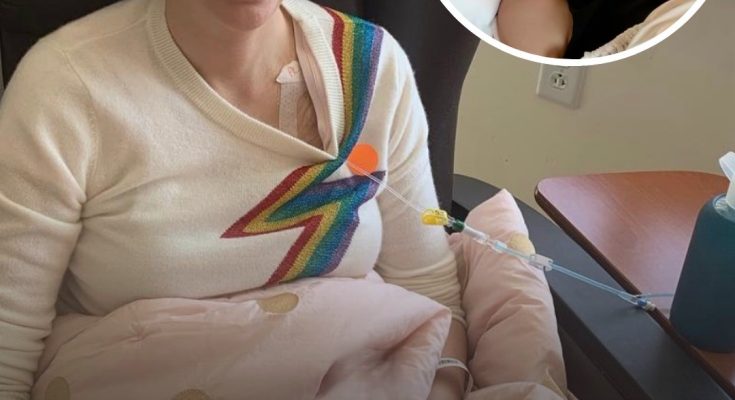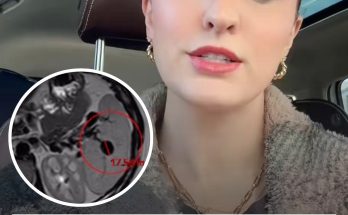A 38-year-old woman diagnosed with stage 3 colorectal cancer has opened up about how her doctor missed one vital symptom.
.jpg_GNJ9W0?tr=w-1024,cr-0.0.1024.573&config=JTdCJTIyYWx0ZXJuYXRpdmVfdGV4dCUyMiUzQSUyMkdldHR5SW1hZ2VzLTE2MDcwOTk4MjglMjAoMSkuanBnJTIyJTJDJTIyY2FwdGlvbiUyMiUzQSUyMkNvbG9uJTIwY2FuY2VyJTIwa2lsbHMlMjBhcm91bmQlMjA1MCUyQzAwMCUyMEFtZXJpY2FucyUyMGElMjB5ZWFyLiUyMENyZWRpdCUzQSUyMFNFQkFTVElBTiUyMEtBVUxJVFpLSSUyRlNDSUVOQ0UlMjBQSE9UTyUyMExJQlJBUlklMkZHZXR0eSUyMiUyQyUyMmNvb3JkaW5hdGVzJTIyJTNBJTdCJTIyZGVza3RvcCUyMiUzQSU3QiUyMmxlZnQlMjIlM0EwJTJDJTIydG9wJTIyJTNBMCUyQyUyMnJpZ2h0JTIyJTNBMSUyQyUyMmJvdHRvbSUyMiUzQTAuNTYlN0QlMkMlMjJ0YWJsZXQlMjIlM0ElN0IlMjJsZWZ0JTIyJTNBbnVsbCUyQyUyMnRvcCUyMiUzQW51bGwlMkMlMjJyaWdodCUyMiUzQW51bGwlMkMlMjJib3R0b20lMjIlM0FudWxsJTdEJTJDJTIybW9iaWxlJTIyJTNBJTdCJTIybGVmdCUyMiUzQW51bGwlMkMlMjJ0b3AlMjIlM0FudWxsJTJDJTIycmlnaHQlMjIlM0FudWxsJTJDJTIyYm90dG9tJTIyJTNBbnVsbCU3RCU3RCUyQyUyMndpZHRoJTIyJTNBMjMwOSUyQyUyMmhlaWdodCUyMiUzQTEyOTklMkMlMjJ1dWlkJTIyJTNBJTIyY2U4MTVlMmMtYjAyYS00NjgyLThlYmYtZDhmZjllM2VhZGE2X193cC1jb250ZW50JTJGdXBsb2FkcyUyRkdldHR5SW1hZ2VzLTE2MDcwOTk4MjgoMSkuanBnX0dOSjlXMCUyMiU3RA==)
Brooks Bell had a gut instinct that something wasn’t right with her health, but medical professionals kept dismissing her.
“I wanted a colonoscopy right from the start,” Bell told The New York Post. “But I had this voice in my head saying, ‘Don’t be dramatic. Don’t be a hypochondriac. Don’t be that girl who runs straight to the scary thing.’”
It took two doctors and two misdiagnoses to get to the truth.
That “scary thing” turned out to be real: stage 3 colon cancer.
And Bell’s timing couldn’t have been more critical. During the time she sought a third opinion, her tumor came within just a millimeter of becoming far more dangerous.
That tiny shift could have slashed her chances of survival by nearly 20%.
Excluding skin cancers, colorectal cancer is the third most common cancer in the U.S. Early-onset cases are rising fast — and by 2030, diagnoses in people under 50 are expected to double.
In 2019, Bell was thriving professionally. The founder of a successful data analytics company, she traveled often and believed she was “pretty healthy,” despite the everyday stress of being a CEO.
“I hadn’t eaten red meat consistently since my teenage years, I was exercising regularly and eating salads for lunch most days,” she said. “I’m not overweight, I’ve never smoked, but it was very stressful running a company with 50 employees.”
Then, in November 2018, she noticed blood in her stool while on a business trip. Alarmed, she searched online and immediately called her doctor.
“The doctor basically told me not to do anything about it,” Bell recalled.
You should keep track of your bowel movements. Credit: Antonio Hugo Photo/Getty
Relieved, she kept going with life in Raleigh, North Carolina. By Thanksgiving, she even joked at dinner that she was “grateful that I have a hemorrhoid, not colon cancer.”
But the bleeding didn’t stop. She saw another doctor — this time in person.
“She didn’t find a hemorrhoid, but still thought that’s what it was,” Bell said. She was sent home with cortisone cream. But her gut kept nagging.
“If you’re bleeding you can’t be healthy,” she said. “I needed to get to the bottom of it, so I decided to get a third opinion. I cold-called a gastroenterologist.”
In January 2019, Bell finally got the colonoscopy she’d wanted from the start.
“Aren’t I too young for colon cancer?” Bell remembers asking the physician’s assistant before going under anesthesia.
When she woke up, her doctor’s face said it all.
They had found the source of the bleeding. It was almost certainly cancer.
It was confirmed as stage 3A — the cancer had spread through two layers of her colon and into two nearby lymph nodes.
But Bell had narrowly avoided stage 3B by just one millimeter. The difference meant a survival rate of 83.4% instead of 64.1%.
“My life wasn’t over, but it just changed forever,” she said. “The ‘Big C’ is now attached to me and that will never be different.”
Her treatment started quickly. Doctors removed the tumor, 10 inches of her colon, and two cancerous lymph nodes. Then came three months of high-dose chemotherapy.
“What people don’t realize is that when you’re done, you might be cured, but you won’t know for a couple of years because after that, it’s a waiting game to see if it comes back,” Bell said. “If it recurs, then you’ll be upgraded to stage 4, and it’s a completely different game plan.”
She described that observation period as the most mentally taxing part. “It’s not the treatment, it’s the waiting and the fear,” she said.
Six years later, Bell is cancer-free — but life will never be the same.
“Once you’ve had cancer, you never fully recover from it,” she said. “Thinking so much about dying changes how you prioritize things.”
She now sleeps 10 hours a night, spends more time with loved ones, and has found purpose in raising awareness for colon cancer.
Alongside her friend Sarah Beran — who was diagnosed with stage 4 colorectal cancer at just 34 — Bell co-founded the fashion brand Worldclass.
The brand aims to break stigma, start conversations, and fund colonoscopies for people who can’t afford them.
“The bottom line is colonoscopies prevent colon cancer,” Bell said. The procedure allows doctors to find and remove polyps — abnormal growths that could become cancerous — before it’s too late.





